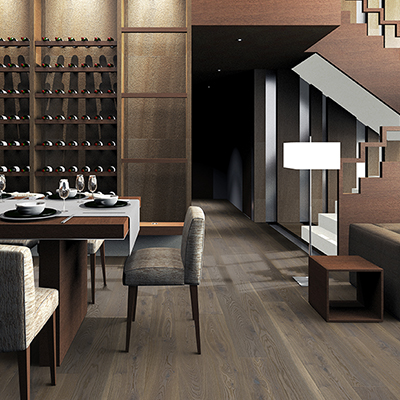Deciding what type of flooring to put into your home is an investment, and today’s market is overflowing with different flooring options. With so much to choose from, deciding which one to put in your home can be overwhelming. Read on to learn the differences between site-finished hardwood floors, prefinished hardwood floors, and Luxury Vinyl Plank (LVP) floors so you can decide which option is best for your Northern Colorado home

Site-Finished Hardwood Floors:
Traditional hardwood floors are a timeless classic that add beauty and value to any home. In fact, site-finished hardwood floors are the only flooring option that often provides a near 100% return on investment. If you are looking to add value to your home, a site-finished hardwood floor may be the way to go. If you are starting with a blank slate, the design options of site-finished hardwood floors are endless.
You will have the choice between:
- Countless wood species options (though red oak and white oak are some of the most common)
- Stain color and finish options
- Installation patterns (such as chevron or herringbone if you are looking to add a unique look to your floor)
- Board widths
- Custom staircases, inlays, and borders
Part of the reason that site-finished hardwood floors provide so much value is their long-lifespan with proper maintenance. They can be refinished and stained multiple times, so the same floor can provide different looks throughout its life. Simple, cost-effective maintenance options also exist with site-finished hardwood floors, such as a screen and coat. The screen and coat process involves lightly abrading the top layer of finish, then laying down a fresh coat on top of it. This is a great option to keep floors looking new before the need for a full refinish.
Site-finished hardwood floors are often fairly easy to repair when damaged as boards can often be replaced, and scratches often sand out. Water can cause excessive damage to a site-finished hardwood floor, so they are not always the best option for every room in your home (such as bathrooms or basements). To learn more about site-finished hardwood floors, check out this blog post about the most important things you should know.
Bottom Line: site-finished hardwood floors are valuable, beautiful, and long-lasting. The installation and sanding process can be messy, but the value they provide is nearly unmatched.
Prefinished Hardwood Floors:
Prefinished hardwood floors are a popular alternative to site-finished hardwood floors that provide a similar look, feel, and performance. Since the floors are finished during manufacturing, the installation process is faster, quieter, and cleaner than a site-finished floor. They are also available in a wide variety of stylistic options including species, color, and texture. Some of these options are desirable because they are difficult to create with site-finished hardwood floors, and you can often view samples of the actual product in person beforehand.
As the quality of a prefinished hardwood floor goes up, so does the price point- with some options starting to the upwards of $15-20/sqft depending on wear layer and thickness of the veneer. Fortunately, prefinished hardwood floors come in multiple varieties including solid and engineered. A solid prefinished floor is exactly what it sounds like, a solid wood floor that is finished before installation, these options tend to be at a higher price point. In contrast, an engineered prefinished floor is created by placing a layer of wood veneer on top of another material such as plywood in a layered construction. These floors have the same look and feel as a solid floor and often come at a lower price point, though some (with high wear layers) may be similarly as well.
Though it is a more difficult (and often more expensive) process, some prefinished floors can be refinished. As they have a beveled finish, sanding them down to be flat is more demanding than sanding an already flat floor. Because the floors were finished at the time of manufacturing, it can be very difficult to repair individual boards if damage occurs, especially if they are engineered. We offer a wide range of prefinished hardwood flooring options with varying prices and wear layers, including many that can be refinished in the future. To see the lines of prefinished hardwood we carry, visit our Prefinished Hardwood Floors page.
Bottom Line: Prefinished hardwood floors provide many of the benefits of site-finished hardwood floors and do come with multiple options in price and quality. The installation process is less invasive and faster than site-finished floors. Solid and some engineered options can be refinished, while “rotary peel” options are a one-time-use floor.
Luxury Vinyl Plank (LVP):
Luxury Vinyl Plank (LVP) is quickly becoming a popular flooring alternative to carpet, traditional vinyl, and hardwood. The largest overall benefit that LVP offers is a lower price point than site-finished or prefinished hardwood floors. This is because it is a manufactured vinyl product as opposed to natural wood.
LVP is one of the few flooring options that is often entirely waterproof. This makes it a great option for homes with pets, children, and for more water-prone areas such as bathrooms and basements. Additionally, LVP floors tend to be quite resistant to damages from scratching or denting. They are often well-suited for rental homes or commercial spaces. When damage does occur, though, there are not many options for repair. As they cannot be sanded or refinished, replacement is usually the only option.
Design options are much wider with LVP than with site-finished or prefinished hardwood floors. It comes in countless styles, many of which are simply unattainable with natural wood. Options that mimic the look and shape of tile, real wood, and more unique finishes make LVP floors beautiful and desirable. That, along with their lower price tag, make them a great option for any area where you desire hard surface flooring. To see the wide range of LVP floors we carry, visit our LVP page.
Though a low price point is an advantage of LVP floors, it can also be a disadvantage. This type of flooring is well-known to be a more “budget friendly” option and won’t do much to boost the value of your home. To learn more about if LVP is the right flooring for you and your home, check out this blog post with more information about LVP.
Bottom Line: LVP floors are affordable and are available in countless design options (some unmatchable by other flooring options). They are waterproof, resistant to damage, and can go in places that hardwood shouldn’t but can be impossible to repair if damage does occur. They are a one-time-use floor.
If you have other questions about which flooring type is best for your home, or are ready to schedule your free estimate, Contact Us today.
